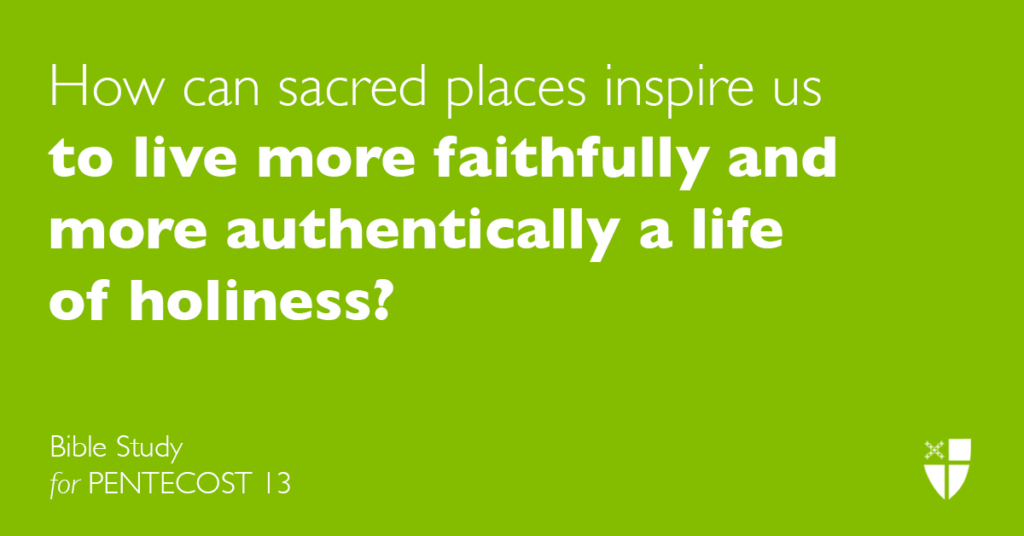This page is available in: Español
Bible Study: Proper 16 (B) – 2021
August 22, 2021
RCL: 1 Kings 8:[1, 6, 10-11], 22-30, 41-43; Psalm 84; Ephesians 6:10-20; John 6:56-69

1 Kings 8: (1,6,10-11), 22-30, 41-43
Solomon’s prayer strikes many important themes – the all-encompassing presence of God, the intuition that God hears prayers and forgives, the affirmation that God responds with graciousness to all. The king’s words also highlight for us a key question – What is the importance of sacred space? Our ancestors in faith invested a great deal of spiritual energy in temples, altars, and mountains they believed to be holy. Our verses from 1 Kings are an excerpt of Solomon’s dedication prayer for the Jerusalem Temple, the ultimate sacred space. Yet Solomon acknowledges that no place can hold God’s presence but rather is a symbol of a liminal place where God can be experienced. Sacred places can be powerful symbols of God’s presence and action in the world, but as the biblical narrative unfolds, ritual actions and pilgrimages to holy places are deemphasized in favor of right living in the imitation of a holy human being.
- How can sacred places inspire us to live more faithfully and more authentically a life of holiness?
Psalm 84
“My heart and flesh rejoice in the living God!” Our psalm verses speak of the grace experienced when we encounter those sacred symbols that point to God’s presence among God’s people. A song of ascent sung by pilgrims journeying together to Jerusalem, Psalm 84 celebrated both the holy Temple and city as what we would call a sacrament – outward signs of grace felt deeply in the heart. This grace is received in response to heartfelt longing – “My soul has a desire and longing for the courts of the Lord” (v. 1). How often have we experienced both this desire and grace as we anticipate being with our church community in a sacred space to which we have been connected for generations.
Psalm 84, with its focus on sacred space, is also a call to fidelity, for God’s abiding presence among God’s people is a reminder of their election, their chosen-ness for service, their call to be a light to all. We might hear in these verses a number of invitations – where are we being called to deeper solidarity on our great pilgrimage of life and faith? What are the symbols of God’s abiding presence among us in our time? When we encounter the grace of our sacred places, how is God calling us to renew our vocation to the service of God’s people?
- How have you experienced God’s grace in sacred spaces?
Ephesians 6:10-20
Our verses from Ephesians ironically utilize apocalyptic imagery to encourage us to preach the gospel of peace! While images of battle-ready Roman soldiers perhaps don’t animate our imagination as they did for our ancestors, we might, however, reinterpret this “call to arms” as an invitation to name and resist the powers that seek to thwart the good news of peace. Our tendency will be to look outside ourselves for these powers, to point to our ecclesiastical, political, and ideological opponents. Indeed, sometimes we must resist those who brazenly seek to advance that which offends human dignity and contravenes the Gospel. Let’s also humbly look within and ask of ourselves, “What part of me rebels against being ‘strong in the Lord’ (v. 10)?” It is the human experience to be a collection of contradictions and conflicting desires. It requires the courage and spiritual armor of the warrior, so well described in our text, to face the shadow within, to admit our rationalizations, to name the roots of our resistances. This kind of work does indeed require the support of spiritual friends – the supplication of the saints (v. 18).
- How and where in your life are you being called to put on spiritual armor so that you may boldly face those “forces”, within and without, that stand in the way of the gospel of peace?
John 6:56-69
“To whom can we go?” Peter’s words are on one level a great expression of humility. Anyone who makes a deep, abiding commitment will ultimately come to such a point, a realization that we’ve invested so much of ourselves into a relationship, cause, vocation, etc., that the doors to other options, for better or worse, are closed.
On a deeper level, we might interpret Peter’s confession here to be a great spiritual truth – ultimate, real meaning can only be found in faith and relationship with God. Many people struggle to find meaning in their lives. I believe this is what lies beneath much of the restlessness and happiness-seeking that goes on in our culture. It is the search for meaning. And to satisfy this search, we are directed toward many avenues – making a name for ourselves, achieving something great, having a family, becoming famous, accumulating wealth, etc. In the end, none of these satisfy our soul-felt longing, because that longing comes from something infinite. As Augustine said, our hearts are restless until they rest in God.
Our theology teaches us that God is the One, the True, the Good, the Beautiful. All of our striving is in some way a reaching toward these virtues because we know that’s where meaning is. Ultimately, we’ll find authentic meaning in our lives when we’re in relationship with this God as we know God. This is when and where we will find the answer to the question, “to whom can we go?”
- Where in your life have you experienced the emotion underlying Peter’s words, “to whom can we go?”
This page is available in: Español
Don’t forget to subscribe to the Sermons That Work podcast to hear this sermon and more on your favorite podcasting app! Recordings are released the Thursday before each liturgical date.
Receive Free Weekly Sermons That Work Resources!
This page is available in: Español


